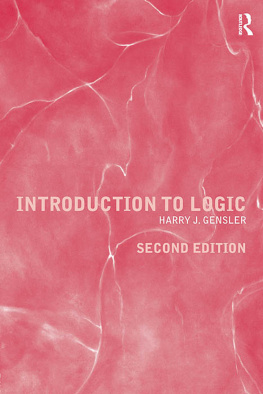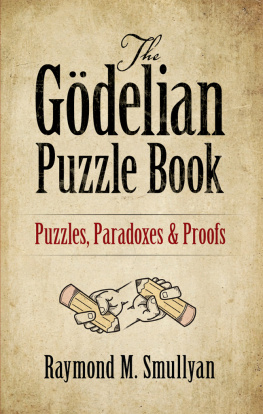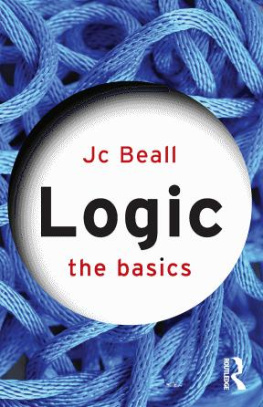Introduction to Logic
This new edition is a significant improvement on an already excellent text. The virtues of the original remain including clear expositions, an intuitive proof procedure that generalizes naturally from propositional logic to more advanced logics and a wealth of problems drawn from philosophical sources. There are new chapters on the history of logic, deviant logics and the philosophy of logic and the accompanying LogiCola program has been improved. This is a student friendly approach to logic.
Michael Bradie, Bowling Green State University
Introduction to Logic combines likely the broadest scope of any logic textbook with clear, concise writing and interesting examples and arguments. Its key features, all retained in the Second Edition, include:
Simpler ways to test arguments, including the star test for syllogisms
A wide scope of materials, suiting it for introductory or intermediate courses
Engaging examples, from everyday life and the great philosophers
Useful for self-study and preparation for standardized tests, like the LSAT
A reasonable price (a third the cost of some competitors)
Exercises that correspond to the free LogiCola instructional program
This Second Edition also:
Arranges chapters in a more natural way, going from easier to more difficult material
Adds new chapters on history of logic, deviant logic, and philosophy of logic
Refines many explanations and expands several sections (such as informal fallacies and relational translations)
Includes a fuller index and a new appendix on suggested further readings
Updates LogiCola, which is now more visually attractive and easier to download, update, and use (install from http://www.jcu.edu/philosophy/gensler/lc or http://www.routledge.com/textbooks/9780415996518)
Harry J. Gensler, S.J., is Professor of Philosophy at John Carroll University in Cleveland. Some of his other books include Gdels Theorem Simplified (1984), Formal Ethics (1996), Anthology of Catholic Philosophy (2005), Historical Dictionary of Logic (2006), Historical Dictionary of Ethics (2008), and Ethics: A Contemporary Introduction, Second Edition (2011).
First published 2002
by Routledge
This edition published 2010
by Routledge
270 Madison Ave, New York, NY10016
Simultaneously published in the UK
by Routledge
2 Park Square, Milton Park, Abingdon, Oxon OX14 4RN
Routledge is an imprint of the Taylor & Francis Group
This edition published in the Taylor & Francis e-Library, 2010.
To purchase your own copy of this or any of Taylor & Francis or Routledges
collection of thousands of eBooks please go to www.eBookstore.tandf.co.uk.
2010 Harry J. Gensler
All rights reserved. No part of this book may be reprinted or
reproduced or utilized in any form or by any electronic,
mechanical, or other means, now known or hereafter
invented, including photocopying and recording, or in any
information storage or retrieval system, without permission
in writing from the publishers.
Library of Congress Cataloging-in-Publication Data
Gensler, Harry J., 1945
Introduction to logic / Harry J. Gensler. 2nd ed.
p. cm.
Includes index.
1. Logic. I. Title.
BC71.G37 2010
160dc22
2009039539
British Library Cataloguing in Publication Data
A catalogue record for this book is available from the British Library.
ISBN 0-203-85500-0 Master e-book ISBN
ISBN: 9780415996501, ISBN 10: 0415996503 (hback)
ISBN: 9780415996518, ISBN 10: 0415996511 (pback)
ISBN: 9780203855003, ISBN 10: 0203855000 (ebook)
Contents
PART ONE
SYLLOGISTIC, INFORMAL, AND INDUCTIVE LOGIC
PART TWO
CLASSICAL SYMBOLIC LOGIC
PART THREE
ADVANCED SYMBOLIC SYSTEMS
PART FOUR
FURTHER VISTAS
Preface
This is a comprehensive Introduction to Logic. It covers:
syllogisms;
informal aspects of reasoning (like meaning and fallacies);
inductive reasoning;
propositional and quantificational logic;
modal, deontic, and belief logic;
the formalization of an ethical theory about the golden rule; and
metalogic, history of logic, deviant logic, and philosophy of logic.
Because of its broad scope, this book can be used for basic logic courses (where teachers can choose from a variety of topics) or more advanced ones (including graduate courses). The teacher manual and the end of both talk about which chapters are suitable for which type of course.
The first Routledge edition came out in 2002. Key features included: (a) clear, direct, concise writing; (b) interesting examples and arguments, often from everyday life or great philosophers; (c) simpler ways to test arguments, including the star test for syllogisms and an easier way to do proofs and refutations; (d) wide scope of materials (likely the widest of any logic text); (e) suitability for self-study and preparation for tests like the LSAT; (f) reasonable price (a third of the cost of some competitors); and (g) the companion LogiCola instructional program (which randomly generates problems, gives feedback on answers, provides help and explanations, and records progress). Im happy with how the first edition has been received, often with lavish praise.
I have made many improvements to this second edition. I have arranged the chapters in a more logical way; so they now go, roughly, from easier to harder material. I added new chapters on history of logic, deviant logic, and philosophy of logic; so the book is even broader in scope than before. I beefed up informal fallacies, added inference to the best explanation, and corrected some typos. I overhauled three difficult sections: on relational translations, belief-logic proofs, and completeness. I did much tweaking of explanations (for example, see the sections on the star test, Venn diagrams, and proofs). I tweaked some exercises. I added an appendix on suggested further readings. I added a real index (previously there was only an index of names); so now its easier to research a topic. And I added a convenient list of rules to the inside covers. I cut two parts that got little use: the appendix on how to download and use LogiCola (the program is now so easy to download and use that this appendix isnt needed) and the glossary (which just repeated definitions from the text). I triedto keep things brief; despite the additions, the book is only 23 pages longer than before. Finally, I did a massive rewrite of the Windows-based LogiCola instructional program (whose source has over 20,000 lines of code which is longer than the book); the new LogiCola is easier to install and update, easier to use, more visually attractive, and improved in many other ways. LogiCola (with a score-processing program, teacher manual, class slides, flash cards, and sample quizzes) can be downloaded for free from either of these Web addresses:
 | http://www.jcu.edu/philosophy/gensler/lc http://www.routledge.com/textbooks/9780415996518 |
All the supplementary materials are conveniently accessible from LogiColas HELP menu; so I suggest that you just install LogiCola (teachers should check the option to install the score processor too).
I wish to thank all who have somehow contributed to this second edition. I thank the Routledge editorial staff and reviewers, who made good suggestions. I thank my logic students, especially the ones whose puzzled looks forced me to try to make things clearer. And I especially thank the many teachers, students, and self-learners who have e-mailed me about the book and software over the years, often saying things like I love the book and software, but theres one thing that Im having trouble with .... If this second edition is a genuine improvement as I hope and trust that it is then there are a lot of people to thank besides me.









